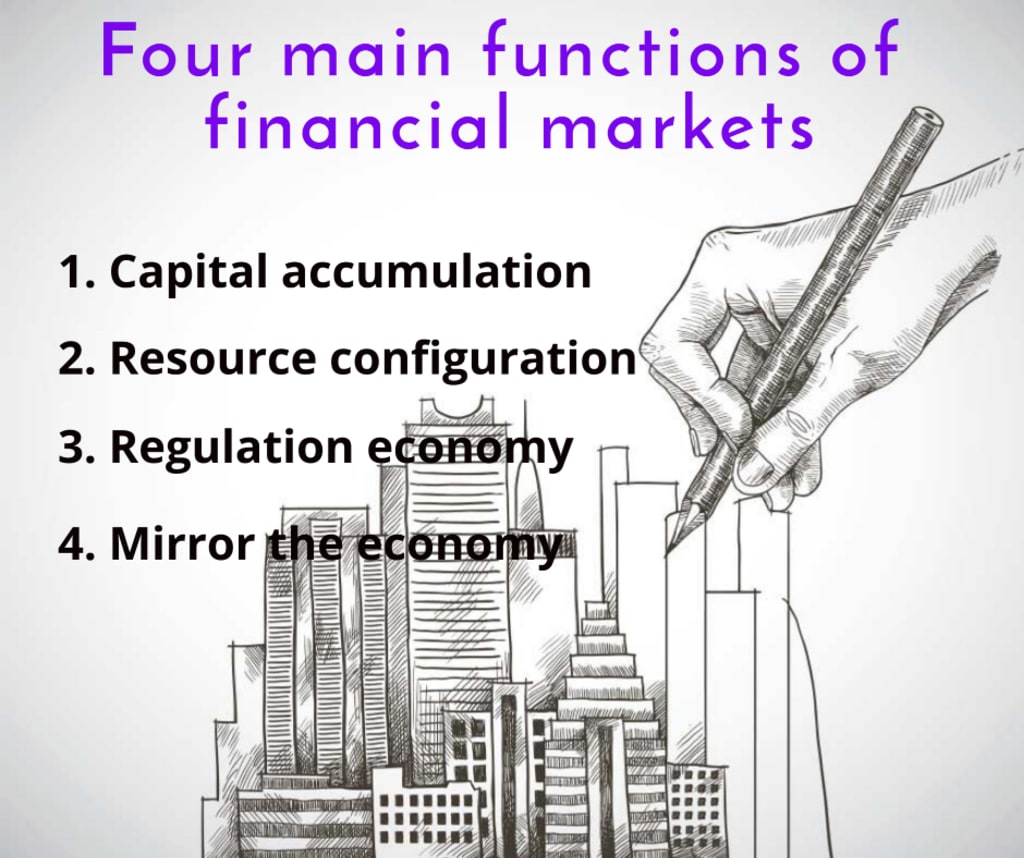Four main functions of financial markets
What are the Financial market-main functions

1. Capital accumulation
The accumulation function of the financial market is the function of directing a large number of small funds dispersed from the financial market to a pool of funds that can be invested in public reproduction. The financial market plays the role of a "store" of funds.
The financial market has the function of raising funds: one is that the financial market creates liquidity of financial assets; the other is to find a way for diversified financing instruments in the financial market to find suitable investment methods for funders.
2. Resource configuration
The distribution function of the financial market is manifested in three aspects: resource distribution, wealth distribution, and risk redistribution.
1. Resource allocation - The financial market transfers resources from low-efficiency sectors to high-efficiency sectors, so that the economic resources of a society can be most effectively allocated to the most efficient or effective uses, and the rational allocation and effective use of scarce resources can be realized. Generally speaking, funds always flow to the sectors and enterprises that have the most development potential and can bring the most benefits to investors. To transfer funds to a bank we need to have a routing number for that bank. For example - to transfer money from First bank USA we need to have the routing number of the First bank routing number to the beneficiary bank Wells Fargo bank routing number. In this way, through the financial market, limited resources can be used rationally.
2. Distribution of wealth - Wealth is the total value of all assets in the hands of different economic units. Governments, businesses, and individuals hold wealth as financial assets. As the price of financial assets fluctuates on the financial market, so will the amount of wealth they own. Some people's wealth increases as the value of their financial assets increases, while others depend on the financial assets they own. The price went down and down. In this way, social wealth is redistributed through price changes in the financial market.
3. Risk redistribution - By using a variety of financial instruments, people who hate higher financial risks can pass the risk on to those who hate lower risk, thereby redistributing risk.
3. Regulation economy
The regulatory function represents the regulatory role of the financial market in the macroeconomy. The financial market is connected with depositors on the one hand and investors on the other. The operating mechanism of the financial market plays a role in regulating the macroeconomy with its impact on depositors and investors.
1. Direct regulation - The direct regulation function of the financial market is in fact a mechanism that guides the formation and rational distribution of capital through a specific mechanism of the financial market. An effective spontaneous regulatory mechanism that affects first the microeconomic sectors and then the macroeconomic activities.
2. Indirect regulation - The existence and development of financial markets has created conditions for the government to indirectly regulate and control macroeconomic activities. Monetary policy is important to regulate the macroeconomic activity. Macroeconomic policies and their special controls include the deposit reserve policy, the re-discount policy, open market operations, etc.
The implementation of these policies is based on the existence of financial markets, financial departments, and companies. The main body of the financial market is a prerequisite. The financial market not only provides a place for monetary policy operations but also provides information that determines the implementation of monetary policy.
In addition, the implementation of the fiscal and political policy is increasingly inseparable from the financial market. The government directs and regulates the behavior of various economic entities through the issuance and use of treasury bonds and provides the central bank with a tool to carry out open market operations. It has a great impact on macroeconomic activity
4. Mirror the economy
The financial market has always been called the "barometer" and "air station" of the national economy and is a well-known signal system for the national economy. This is, in fact, a description of the opposite function of the financial market. The opposite function of the financial market is manifested in the following aspects:
1. The financial market is mainly an indicator that reflects the working conditions of the microeconomy. Since most of the trading in securities takes place on the stock exchange, people can learn about the buy and sell prices of various securities and evaluate investment opportunities at any time through this market route. Financial market operations, directly and indirectly, reflect changes in the country's money supply.
The financial market has a large number of specialists who have been engaged in market research and analysis for a long time and communicate directly with various industries and trades every day to understand the development of the company.
The financial market has an extensive and timely communication network to collect and disseminate information. The world's financial markets have been integrated and coordinated so that people can keep abreast of global economic development and change.
The price of financial products in the financial market reflects the expectations of all economic entities involved in market operations regarding the future profitability of these products. For this reason, the financial market has the function of finding a price.






Comments
There are no comments for this story
Be the first to respond and start the conversation.